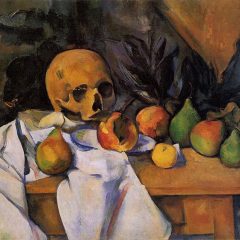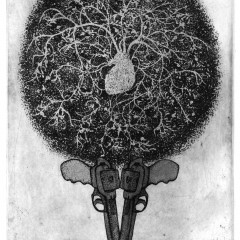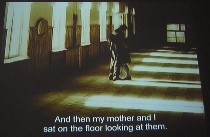 Foreign art video, like foreign films, are just plain different from what Americans produce–it’s a nice reminder of how our perspectives are formed by our time and place (left, nostalgic still from “Killed by Lightening”).
Foreign art video, like foreign films, are just plain different from what Americans produce–it’s a nice reminder of how our perspectives are formed by our time and place (left, nostalgic still from “Killed by Lightening”).yufit, yevgeniy
Russian artist Yevgeniy Yufit and his “necrorealist” films at Pageant: Soloveev were the highlight, although I suffered from the chill in the gallery and my ineptitude with the remote control. But gallerist Daniel Dalseth had blankets at the ready, folded up neatly on each of the pews arranged in front of the video screen. He also took pity on me and brought me hot tea (made in a beautiful, painted Russian tea set, a wedding present from friends of his Russian wife).
Dalseth explained the Yufit was part of the first generation that hadn’t experienced the patriotism of the Soviet glories of World War II. Necrorealism is an underground, illegal film movement of the 1980’s characterized by movies in which packs of crazed zombies in a surreal Russian landscape commit acts of violence and murder.
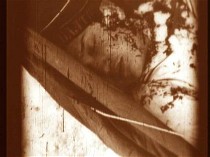 The brisk indoor weather there was a nice match for all the Punch ‘n Judy manic chases, fisticuffs and head-bashing in the snowy woods. There was a silly, horror-movie dark humor at play here (right, still from “Werewolf Orderlies”).
The brisk indoor weather there was a nice match for all the Punch ‘n Judy manic chases, fisticuffs and head-bashing in the snowy woods. There was a silly, horror-movie dark humor at play here (right, still from “Werewolf Orderlies”).nitsch, hermann
Anyway, I’m adding my thumbs-up to Roberta’s for this work (see post). The shorts, with their grainy black-and-white jumpiness, made me think of Harold Lloyd and the Three Stooges.
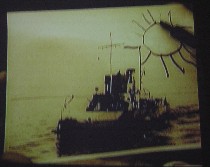 The surreal situations where all hell breaks loose are political commentary on bureaucracy gone wild and the disintegration of social norms as the Soviet Union began breaking up. It’s “The Office” with the veneer of any sort of system, let alone a sane one, completely removed.
The surreal situations where all hell breaks loose are political commentary on bureaucracy gone wild and the disintegration of social norms as the Soviet Union began breaking up. It’s “The Office” with the veneer of any sort of system, let alone a sane one, completely removed.
A nice touch in all the films is the way Yufit adds titles–writing on blackboards or with a magic marker or typing on a computer screen–using whatever simple means works with what’s going on (left, using a magic marker on an old photograph to indicate how memory is unrealiable and changes the past, “Killed by Lightening”).
Yufit is a big name in the European art video world. He was this year’s Filmmaker in Focus last month at the 2005 34th Rotterdam International Film Festival and was in Manifest 5 European Biennial of Contemporary Art. Dalseth, who spent time in St. Petersburg researching Russian art, met Yufit there, and they became friends. Look for more quirky, interesting shows from Dalseth, who clearly marches to a different drummer.
The only one of the four full-length movies from Yufit that I saw was “Killed by Lightening.” Part of what struck me in this sepia-colored film, with its mix of archival and original footage, was how similar in tone it was to Janet Cardiff’s walks, a haunted mix of past and present, personal and political, flickering back and forth.
The movie frames the elusive memories with computer-generated “scientific” certainty. The pace of the movie is slow and elegiac, the light-and-shadow images ravishingly beautiful. The mix of digging through personal memories and digging through the history of man’s evolution leads to the conclusion that we’re no more advanced than Stone Age men. (I made a random choice on which movie to see. Alas, I picked the same one Roberta had reported on).
These films could not have been made in this country at this point in time. They have an angst delivered with bitter irony that’s pure Russian.
 In my own little self-curated foreign-film festival, I also went to the Hermann Nitsch videos at Slought, “Hermann Nitsch / Die Aktionen: 1962-2003.”
In my own little self-curated foreign-film festival, I also went to the Hermann Nitsch videos at Slought, “Hermann Nitsch / Die Aktionen: 1962-2003.”
I’m pretty tough (and I was prepared), and all the animal blood and guts and ritualized victimization didn’t upset my stomach at all. The work, however, is unethical, and to argue it away by saying it’s not as unethical as war or the Holocaust or that it’s a healing religious ritual is to ignore that the work is debasing to humans and to animals (right, Hermann Nitsch).
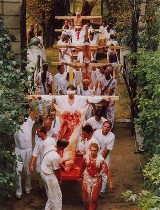 Kneading animal guts, smearing and pouring animal blood, immobilizing people with blinders on crosses and pouring blood and other concoctions into their mouths, over their bodies, onto their displayed sexual organs, with someone else choreographing the moves and being in control is both pornographic and disrespectful to the people and the animals.
Kneading animal guts, smearing and pouring animal blood, immobilizing people with blinders on crosses and pouring blood and other concoctions into their mouths, over their bodies, onto their displayed sexual organs, with someone else choreographing the moves and being in control is both pornographic and disrespectful to the people and the animals.
I like the Chinese thinking about wasting no part of an animal that you slaughter. The waste here is an unspeakable excess (images left and right, Hermann Nitsch, 6-Tage-Spiel, Prinzendorf, 1998). It is the product of a culture that can convince itself to have no respect for life.
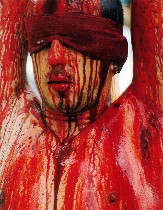 While watching the 6-day play at Prinzendorf, Nitsch’s estate, I spent time trying to put myself back in that time in the ’60s when middle class people were able to convince themselves that it was OK to kill “the pigs,” that love (i.e. sex) was free, that bombing buildings and rioting were the right thing to do. At some point, I remember sitting in a meeting with people–academic intellectuals all–who were seriously considering a bombing. It was the end of my career as a radical. Sometimes bourgeois values get it right.
While watching the 6-day play at Prinzendorf, Nitsch’s estate, I spent time trying to put myself back in that time in the ’60s when middle class people were able to convince themselves that it was OK to kill “the pigs,” that love (i.e. sex) was free, that bombing buildings and rioting were the right thing to do. At some point, I remember sitting in a meeting with people–academic intellectuals all–who were seriously considering a bombing. It was the end of my career as a radical. Sometimes bourgeois values get it right.
My other train of thought was about “Fear Factor,” “The Exorcist” and “The Passion of the Christ.” Well, I am nothing if not consistent. I don’t really care to watch any of these things.
 If you like “Fear Factor” (left), which I also think is debasing, perhaps you won’t be offended by this work. Or you may be offended. This work is even more grotesque. If the gore in “The Passion…” doesn’t undercut the religious ritual for you, this might be work you’d like. Nitsch borrowed shamelessly from religious as well as rain king and morality play rituals. The 6-day play, for example, had crosses, Gregorian chants, even church bells and processions. But the statues usually carried in religious processions have been replaced by naked, live people on crosses. This is not progress. It’s a regression to primitivism.
If you like “Fear Factor” (left), which I also think is debasing, perhaps you won’t be offended by this work. Or you may be offended. This work is even more grotesque. If the gore in “The Passion…” doesn’t undercut the religious ritual for you, this might be work you’d like. Nitsch borrowed shamelessly from religious as well as rain king and morality play rituals. The 6-day play, for example, had crosses, Gregorian chants, even church bells and processions. But the statues usually carried in religious processions have been replaced by naked, live people on crosses. This is not progress. It’s a regression to primitivism.
“The Exorcist” on the other hand seems to me to have a camp quality that infuses most horror movies and makes them pure entertainment. There’s no real blood from man or beast, no real abuse or pornography. The orgies, on the other hand, are humorless and literal. Not much of a parallel, here.
The triumph of the Old Testament is that Isaac isn’t sacrificed to God. The Greeks, when they invented tragedy, no longer needed to spill blood in a ritual sacrifice because they figured out a way to pretend to spill blood–in Greek tragedy–and thereby right the wrongs in the social fabric. That, not the Bacchanalian orgy, is the glory that was Greece.
[For another take on Nitsch, read Roberta’s article in the Philadelphia Weekly and Colette Copeland’s post below.]




